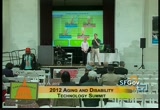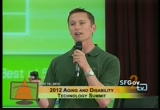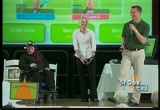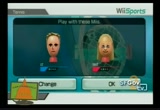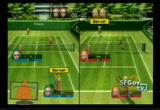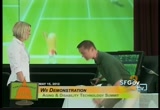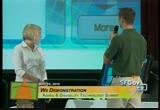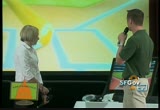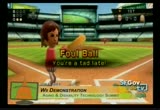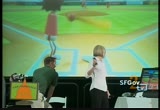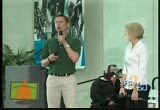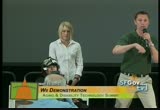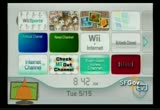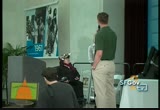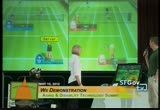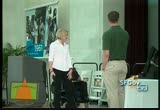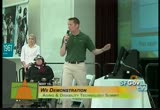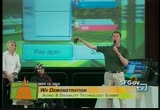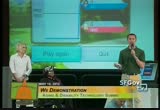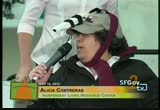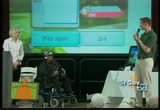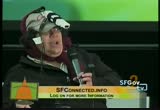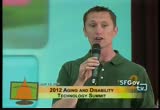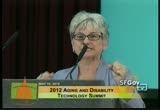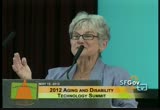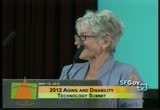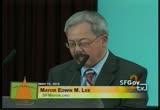tv [untitled] November 30, 2012 10:00am-10:30am PST
10:01 am
>> good morning, everybody. welcome to the technology summit. we are looking forward to a fantastic day. we are going to start with a demonstration of the wii system. it is an interactive gaming system that allows people to play different activities and participate in different fitness activities together. a lot of wii systems, about 40, are being deployed around the city to different senior
10:02 am
centers and residents facilities to encourage older adults to get more involved with physical activity using technology. we're going to spend the first 30 minutes or so demonstrating the wii. not only will we demonstrate how to use it, but we will doe demonstrate adaptive devices so that it can be an inclusive activity for all adults and children. my name is dr. chris thompson from the university of san francisco. go, dons. 1855. i have not been there that long. i am in the department of exercise and sports science. i think it is a good match for me to be demonstrating the wii, which is a good physical activity.
10:03 am
i am joined on the stage by a student, not from usf, but from san francisco state. we actually talk to each other. this is mackenna. >> good morning. >> finally, i am joined by alicia from the independent living center in san francisco. it is great for all of you to be here today. people will be trickling in over the next half hour. we will give you a taste of what wii is like. we have set up the game. i will start by playing mackeena in a game of tennis. the interesting thing about wii is we use this little remote. just by moving our arms, we can
10:04 am
control movement on the screen. you will be watching up on the big screen as we play a game of tennis. are you ready? all right. we will select two players. that is me. does that look like me? it kind of those -- of does. does that look like mackenna? that is not by chance. you can make the person look like anything you want. they can even look like aliens. interesting. we are going to play some great tennis today. ok. one thing to tell you, there is a little bar on top of the television. it picks up the movement of our arms. we're going to face the
10:05 am
television as we play. here we go. how many of you are cheering for me? how many of you are cheering for her? what is up with that? [laughter] that is it. you are going down. we're going to play a single game of wii tennis. are you ready? all right. here we go. we're going to get intense. [applause] >> eco dash 15. -- 0-15. [applause] 0-30.
10:06 am
10:07 am
ok, we're going to demonstrate one other sport quickly. then alicia and i will play. maybe i will have them play a game of wii tennis themselves so we can see how the adaptive equipment works. we're going to go to quit. we're going to a different sport. we're going to go to baseball. all right. we have two players for baseball. in baseball, you have a pitcher and hitter. i will be pitching. actually, i will be hitting. she will be pitching. are you ready? ok. go ahead. oh, no.
10:08 am
[laughter] that is not good. all right. i have one strike on me. oh, no. this is horrible. the pressure. oh, i think i struck out. this is not good. [laughter] ok. very good. she can choose different pitches to pitch. that is kind of fun. here is our team. our team is getting ready to take the field. we will be playing each other in a really tough game of baseball. it looks like a nice day over at&t park. let's do this thing. oh, i swung too late. strike one.
10:09 am
too early. strike two. oh, no. [laughter] i'm out. this is awful. this is very embarrassing. pitch. yes! what a catch! that was a great catch. our final out in the inning. go ahead. fouled it off. destroyed. uh oh. oh, no. i did not score that inning. i did not even get a hit. now we switch. i am attaching -- pitching. i will throw a fastball right by her. fastball coming, the heater.
10:10 am
yes! strike. oh, my gosh. that is crushed. she is going to have an inside the park home run. this is not good. a triple. that is not good. boo. boo. that is it. you are going down. here comes a tough pitch. strike! there we go. strike! i struck her out. one out. if she scored a run, she will win. we have to refer her to strike out two work times. -- we have to root for her to strike out two more times. use long to early. he swung too late. you are going down now.
10:11 am
too early. this is it. this is the final. this will be a tie game. oh, no! this is awful. i made the catch. we ended up tying the all of the innings. we both played a full inning. one of us pitching, one of us hitting. it is a fun way to engage in an activity together, get a little competition. it is always friendly competition. good game. [laughter] ok. but we also want to show is that the wii can be used with people who may have disabilities, who might not have full use of their arms or legs. we have alicia from the independent living center to help us demonstrate some adaptive equipment specific for
10:12 am
people with disabilities to use the wii. it is great to have you with us. >> thank you. great partnership. >> you will turn yours on. ok. notice she has a hat on that has a wii remote mounted on it. instead of using her arm to control the remote, she uses her head. we will play a couple of games. it will be me against alicia. you better root for alicia. this is the main menu screen when you start wii.
10:13 am
the main activity is in the left corner, sports. turn yourself off. are you off? keep yourself off. we choose on the menu. hit a for you. on the main menu, on the upper left-hand corner we see sports. that is the activity we loaded in the console. using her head, she is choosing wii sports. it will be the two of you against each other. what is interesting is we have buttons. instead of buttons on the remote, there are buttons she can use her hands with allowed
10:14 am
to be an adaptive devices for someone with a disability. turn on your remote. he will play against each other. i will narrate. it will be mackenna versus alicia in a game of tennis. winner takes all. hit no for save file. these are the introductory menu screen for wii, very simple to navigate through. we will choose tennis at the top of the screen. they will choose two players. we have created a character that looks a lot like alicia and another character that looks like mackenna. they will be playing against each other in a game of tennis. all right. all they do is simply stand
10:15 am
facing the television. you will push a. hit ok. hit a. hit a and b together. here we go. single game start. alicia will be serving. mackenna will be receiving the surf. we will see what happens. by using her head, she is able to serve. nice shot. mackenna gets the first point. watch how alicia turns her head to control the swinging of the racket. interesting stuff. she is serving again. mackenna hits out of bounds.
10:16 am
you are tied. very well done. here comes another serve. boom. great serve. good enough. alicia scores another point just by turning her head. good try, mackenna, but you did not get anything. tie ball game. a great return by mackenna. alicia could not quite get to that one. she swung too late. 30-30. nice work. 40-30. one more point and alicia wins the game. mackenna missed it. alicia wins.
10:17 am
let's hear it for alicia. that is a quick overview of how we use the wii. questions? the question is, do you have to have a special computer to connect the wii to a television? the answer is no. this box is the council. you plug the cd into it and plug into the tv. any television will work with the wii. it works well with a big flat screen tv because you can see the action better. good question. one more question. allen? the average cost? if you are one of the contract in city senior centers, this is part of our broadband technology
10:18 am
grant, the average cost is zero. [laughter] if you were to buy this for your home, it costs a couple of hundred dollars. the games cost between $20.40 dollars. they have hundreds of different games to play. to the games cost between $20.40 dollars. and hundreds of different games to play. we have other adaptive devices that can be used with the wii. this is a foot pedal. -- this is a foot pedal. along with the buttons on the hand device connected to alicia's remote, we can use foot pedals if there are games the require numerous controls. it is very adaptive. then, really interesting. what about someone who may be a
10:19 am
quadriplegic and does not have the ability to use arms or legs? there is a sip and tug adapter that allows someone to control the wii with his or her mouth. you can still engaged the wii by puffing into the tube. this company has made the wii completely accessible for anyone to play. it is a great option. if you want more information about the adaptive equipment for the wii, visit alicia's booth. >> i work for the independent living center in san francisco. i manage a program for people with disabilities that need assistance devices. there is a great program with
10:20 am
the at&t network. a co-worker and i work with it. if anyone is interested in borrowing the equipment, you can call our office. we can help you to register. it has no cost. you can keep it up to 30 days. you can borrow a lot of things that will help people with different needs to play wii or do anything else. even simple things. let's say someone wants to buy a walker but you are not sure what kind. if the center happens to have different ones, you can try different walkers before you make a final decision of what you want to buy. >> fantastic. they will have a resource table throughout the course of the day. if you want more information about the adapted wii equipment,
10:21 am
this is what it comes in. when we went through the metal detector this morning, they looked very closely at this thing. it just has the remotes, the sip and puff, and the different adoptive -- adaptive equipment for the wii. the cost is around $1,000. they have already purchased it. they will let the center's bartlett for free. this is a nice resource. -- they will let the centers borrow it for free. this is a nice resource. you can borrow it from the adoptive living center. any other questions about using the wii? are you looking forward to having the opportunity to use the we at your center? no? [laughter]
10:22 am
ok. some people might not be into using the wii. that is perfectly fine. yes? blind person. there may be some opportunities for people who are visually impaired. >> the director of our center is blind. she was telling us a story. she had a lot of fun playing bolling -- bowling. if you can remember what movement and where you had to do it, it is very fond -- very fun. bowling is one of the possibilities with the wii without having any adaptation, just having the remote and directing the person in the right spot. >> i have heard a couple of people have commented they cannot afford the wii. go to your local senior center.
10:23 am
the broadband technology grant program has purchased about 40 systems to be distributed throughout the city. find out if your local senior center is part of that program and has a wii. i am going to be doing training with all of the senior center a activity directors in the next couple of weeks so that all of them will know how to supervise and manage and use the system. by this summer, there should be wii at a senior center near you. we urge you to try out this new activity. it is really fun to play golf, tennis, baseball, even boxing. challenge someone you do not belong with well at the senior center to a game of boxing, but do not actually punched a person -- punch the person.
10:24 am
do not do that. it should be a great opportunity this summer to experience the wii. they will start with the formal program in a few minutes. we wanted to give you a demonstration of the wii. look forward to seeing you soon look forward to seeing you soon in the future. >> how about we get a big thank you to the wi-fi folks were in here earlier, getting us ready for the day. let's give a big round of applause for all the wi-fi. [applause] i am the director of the book -- the department of aging and adult services. it is with great pleasure that i welcome all of the san francisco's aging and disability technology summit, the first one that we have held in san francisco. and what a day this is going to be.
10:25 am
if you have looked at the program, you know it is full of speakers and interactive devices and all kinds of things to make this day actually pretty magical. #zmkqrçosv37çw&?çç intrg our interpreters, so could those folks raise their hands so folks know where they are in the room? we have got translation going on for anyone who needs it, and there are folks outside that can hook you up in the most appropriate way for that. i was also asked to ask all of you if you could move towards the center, because as you can tell, we have got a lot of folks coming into the room from outside, and we want them to be able to not have to climb over everyone so they can take a seat. today's event is about connectivity, a connection through technology. and in order for that to happen, it is really essential that city leaders and understand the importance of connectivity, the
10:26 am
complexity of it, and the why of it. it is important that all of that be understood. our mayor understands all of that and more. he understands the importance of it, the complexity of it, the why of it, and if you have been following the news at all, you know through what you have read that he has been very, very forceful in moving forward in this area. it is my pleasure to introduce the mayor of san francisco, ed lee. [applause] >> good morning, everyone. welcome to city hall. all right. well, your board president david i chew and -- david chiu were just discussing what game we were going to play each other what we go outside and work on
10:27 am
your computers. we look forward to that. i want to thank ann and the aging and adult department for wonderful leadership. third summit. thank you very much. congratulations, because you have been not only engaging our communities, but your department has always been looking at four things that would help increase capacity -- for things that would help increase capacity interconnectivity. this year's summit's focus on creativity and technology and be sure that we use the wonderful grant from our federal partners in the department of commerce to help us engage healthier, happier, and more connections with our aged community and persons with disabilities. it is a wonderful goal, and we have a lot to talk about today. i also want to welcome all of the businesses that have been partners with this. you know, when it comes to
10:28 am
technology, we in the government can never do it alone. whether it is federal, state, or local government, we have got to work with our private partners so that all of the media connections can happen. i want to give a shout out to comcast, verizon, the san francisco health plan, scan health med, unlock, our media partners, and all the organizations and volunteers working along with us to help our seniors and helping our people with disabilities connect end. this launch, this summit really is to launch a new program, our sf connected program. this allows us to work with all of our seniors in as many locations throughout the city get connected up. to provide a higher level of digital literacy and broadband adoption, whether it is in our community centers, our housing authority centers, our low- income service centers alike.
10:29 am
we are announcing today that we are going to complete with this grant 53 locations throughout the whole city. 53 of them. [applause] we have already got 28 of them set up, and by the end of the month or early next month, we will have a national 25. that is going to be a lot of -- an additional 25. that is going to be a lot of places where our populations can become that much more digitally illiterate and they can benefit from the innovations of social media and have health resources and information online and also be able to play some games as well as visit your family online as well. [applause] you know, when you get more digitally connected, you are going to be able to find that there are going to be great ways to talk to your doctor or your nurse. you're going to be able to
89 Views
IN COLLECTIONS
SFGTV2: San Francisco Government Television Television Archive
Television Archive  Television Archive News Search Service
Television Archive News Search Service 
Uploaded by TV Archive on

 Live Music Archive
Live Music Archive Librivox Free Audio
Librivox Free Audio Metropolitan Museum
Metropolitan Museum Cleveland Museum of Art
Cleveland Museum of Art Internet Arcade
Internet Arcade Console Living Room
Console Living Room Books to Borrow
Books to Borrow Open Library
Open Library TV News
TV News Understanding 9/11
Understanding 9/11
